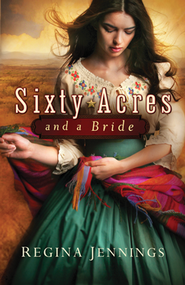What sort of reception did Ruth, a heathen, receive upon relocating to Israel? How did Ruth feel about practically forcing Boaz to marry her? And likewise, how did Boaz feel?
Regina Jennings' novel Sixty Acres and a Bride looks deeper into the story of Ruth, exploring the relationships, emotions, and prejudices that might have similarly affected Ruth and Boaz themselves.
Placing it in 1878 Texas, with Rosa, the Ruth equivalent, a native Mexican who accompanies her American mother-in-law back to Texas, Jennings dives right into the prejudice toward and the fascination of a foreigner who tries to join the rest of society rather than existing on its fringes. Since she is now the daughter-in-law of one of their own, the locals cannot ignore Rosa and must try to accept her in spite of her improper ways. As a foreign woman, she is colorful and different, attracting the eyes of the male population while inspiring jealousy and horror among the women. Modest attire in the Sierra Madres turns out to be scandalous in Texas; a dance that embodies propriety in Mexico becomes a seductive act suggesting wanton behavior among the Americans. Rosa stumbles repeatedly in American culture, just as Ruth no doubt experienced the shock of Israelite culture. In addition to cultural mistakes Rosa makes, she also faces the
prejudice of a Mexican among Americans - even today, Hispanic immigrants
are often seen as second-class citizens and automatically disregarded
due to their coloring and country of birth. Likewise, the Moabites, though far distantly related to the Israelites, were not children of Abraham, and therefore little better than the other heathen nations surrounding them. Ruth was every bit the second-class citizen as Rosa.
Jennings also depicts the horror and embarrassment of the girl as she humbles herself to a reputation-shattering position as she begs financial rescue for herself and her mother-in-law. In Sixty Acres and a Bride, Rosa pleads with the kinsman redeemer for money rather than marriage, but the end result is the same - he saves them financially and chooses to marry her (though as much to salvage her reputation as out of attraction). So Rosa finds herself saddled to a man who married her through obligation, and her husband knows that she, too, married him under duress; they must learn together how to love and respect each other as spouses and overcome the fear of potentially being unloved in return. Ruth and Boaz could not have been much better acquainted, and probably had less of a relationship before marriage than Rosa and her Weston. Ruth 4:13 says, "So Boaz took Ruth and she became his wife, and when he went in to her, the Lord gave her conception, and she bore a son." It offers no details of how their relationship progressed, whether it took a day or a year before they were comfortable together as a couple. Jennings' novel offers us just one possibility to consider, but it also inspires us to contemplate other situations Ruth may have experienced, and even how we ourselves might act under similar circumstances.
Overall, Sixty Acres and a Bride is a beautiful story - detailed, exciting, sprinkled with moments of humor, sporting a villain one loves to hate, filled with tenderness, and ripe with hope. Not many novels inspire me to tears, but as a bride myself, I found that this one really speaks to the hopes and fears of a young marriage. No matter how in love and prepared one feels prior to the wedding ceremony (and Rosa and Weston scarcely felt ready at all), learning to put aside one's individual self in order to live as one with one's spouse is a bumpy road, and small misunderstandings between a husband and wife can lead to great hurt without immediate reconciliation. Thankfully, God's grace sufficiently covers us in our foolishness, and Jesus came to heal our bodies and hearts (and, of course, to save), and so we can truly love our spouses with God's perfect help. "There is no fear in love; but perfect love casts out fear," I John 4:18a.
The positive attributes of this novel so far outweigh the flaws that I rate it a 5 out of 5.
Ladies of Caldwell County
Sixty Acres and a Bride
Love in the Balance
Caught in the Middle

No comments:
Post a Comment